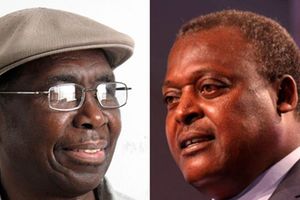
Retiring Chief Justice David Maraga handing over a book containing the Kenyan Constitution to acting CJ Philomena Mwilu at the Supreme Court of Kenya on January 11, 2021.
| Evans Habil | Nation Media GroupNews
Premium
Mwilu earns rare first as she takes over from Maraga
What you need to know:
- During David Maraga's tenure, which lasted four years and three months, he opened 22 new court buildings, most of which were funded by the World Bank.
- Justice Mwilu pledged to entrench Justice Maraga’s legacy,e whose tenure was marked by rows between the judiciary and the executive.
Justice Philomena Mwilu has historically become Kenya’s first woman to lead the judiciary after taking over as acting Chief Justice yesterday.
The 62-year-old Supreme Court judge, who is facing three ouster petitions at the Judicial Service Commission (JSC) due to alleged misconduct, will lead the institution until a new Chief Justice is appointed.
She will hold the office for at least 120 days, as the JSC searches for Justice David Maraga’s successor. He retired yesterday after attaining the mandatory age of 70 years. Justice Maraga has served the judiciary for 17 years.
According to Section 5 (4) of the Judicial Service Act, in the event of the removal, resignation or death of the Chief Justice, the deputy Chief Justice is supposed to hold office on an acting capacity for a period not exceeding six months pending the appointment of a substantive office holder. And, at exactly 11.01am yesterday, Justice Maraga removed his robes assisted by his former clerk Fidelis Simiyu. He handed over government assets that were in his possession to Chief Registrar Anne Amadi— including the official car, national flag and number plate CJ1.
The retirement process started with an application by Law Society of Kenya (LSK) president Nelson Havi urging the Supreme Court to issue an order that Justice Maraga be deemed to have retired effective yesterday mid-night.
The five-judge bench comprising of the outgoing CJ, his deputy and justices Mohammed Ibrahim, Isaac Lenaola and Smokin Wanjala allowed the application.
Personal attention
According to the rules of the court, Justice Maraga was not supposed to sit in that bench as he was the subject of the application, but was forced to so following the absence of Justice Njoki Ndung’u. Justice Mwilu said Justice Ndung’u was handling a matter that required her personal attention, hence the quorum hitch. In his speech, Justice Maraga urged judges and magistrates to remain steadfast and fearless in upholding the Constitution and the rule of law.
“We must continue to invest in a strong, independent, fair and effective judiciary bearing in mind that the sustained economic prosperity and the long-term political stability of this nation can only be guaranteed if the rule of law reigns,” he said. He thanked God, his wife and family, the legal fraternity, Kenyans, parliament, the executive, development partners and others for their support.
“Your solidarity and steadfast defence in moments of trials only strengthened my resolve to serve you up to this day,” he said. He exited the stage as he acknowledged greetings from judiciary staff and headed to his private car escorted by the acting CJ.
During his tenure, Justice Maraga stood out for upholding the independence of the judiciary and the rule of law amid attacks from the executive. He will also be remembered for his push for adoption of IT in courts and the entire justice system.
The judge, who chose his faith over work during an interview by declaring that the Supreme Court would not sit on Sabbath, learnt how to type and use computers in his 60s and has since been typing his judgments.
During his tenure, which lasted four years and three months, he opened 22 new court buildings, most of which were funded by the World Bank.
Maraga legacy
He appointed 94 judicial staff and presided over 172 cases of complaints on judicial officers. The jurisprudence he leaves behind on electoral law, commercial law and piracy is large and has been invited across the world to give lectures in different universities— including Harvard and Oxford.
And while receiving the instruments of authority yesterday, Justice Mwilu pledged to entrench Justice Maraga’s legacy,e whose tenure was marked by rows between the judiciary and the executive.
“For whatever period that will please God for me to be the acting Chief Justice, I will ensure that we further entrench and build on your legacy and that the judiciary shall forge ahead and continue with its journey of transformation,” said Justice Mwilu.
She added that it had been an honour and privilege to work as Justice Maraga’s deputy as she has learnt immensely from him on mentorship, encouragement in moments of weakness and advice.
Judge Mwilu has performed two public assignments as acting CJ, the first being the swearing-in of Tiya Galgalo and Esther Murugi as members of the National Land Commission (NLC). The second was the admission to the Bar of 31 advocates at the Supreme Court.
However, her service is subject to litigation following a petition filed by rights activist Okiya Omtatah, arguing that the position is unconstitutional, in circumstances where an office holder is retiring upon the expiry of his tenure.
Mr Omtatah argues that there is no provision in the constitution for the DCJ or any other person to act in the office of the Chief Justice in the CJ’s absence. He adds that there cannot be an acting Chief Justice because the constitution only recognises the Chief Justice appointed in accordance with Article 166 (1)(a).
Acting Chief Justice
“Any attempt to howsoever create a substantive position of acting Chief Justice, including by statute, and appoint a person other than as contemplated by the constitution, and allow him/her to exercise constitutional functions and powers of the Chief Justice, amounts to the creation of an unconstitutional office and the unconstitutional exercise of functions and powers of the constitutional office of the Chief Justice,” says Mr Omtatah in the petition.
With over 32 years of experience in the legal profession, Justice Mwilu joined the judiciary in 2007 as a judge of High Court.
She first served in the Commercial Division in Nairobi and later the High Court in Eldoret.
She was later transferred to Nairobi where she served at the Criminal Division and subsequently headed the Environment and Land Division of the High Court.
In December 2012, she was elevated to the Court of Appeal where she served until her appointment as the Deputy Chief Justice on October 28, 2016.
Before joining the judiciary, she had engaged in private practice and also worked as a senior legal manager at Jubilee Insurance Company.
She had also served as the Board secretary at the Electricity Regulatory Board, the deputy chairperson of the Energy Tribunal and a director on the board of the Nairobi Water and Sewerage Company.
jwangui @ke.nationmedia.com [email protected]






